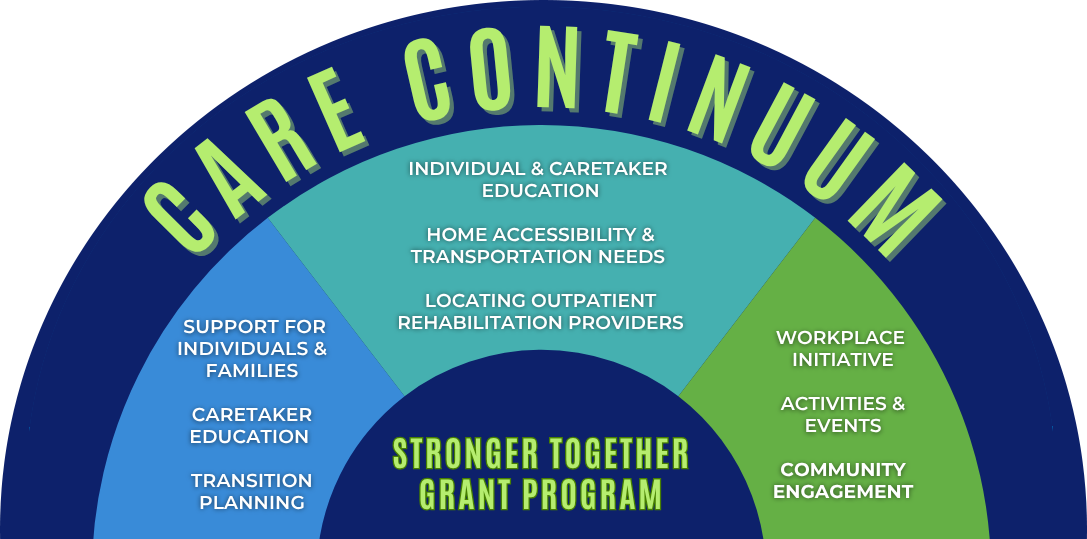Advancing Innovation, Enhancing the Care Continuum.
The Thomas E. Smith Foundation (TESF) provides comprehensive and innovative programming to support persons with spinal cord injury (SCI) and paralysis across their continuum of care.
Since 2010, of lived experience and hundreds of people supported over our fifteen year history, TESF is able to provide support at various points throughout each stage of the care continuum. This included the initial “acute” care stage, the “transitional” care stage, and the “long-term” care. Our care continuum support delivers several key benefits:
Improved Quality of LIfe
By addressing the physical, emotional, and social needs of individuals with paralysis, our work helps them achieve a higher quality of life.
Enhanced Independence
Our programs are designed to empower individuals to regain independence and participate fully in their communities.
Caregiver Education
By providing support and resources to caregivers, we help alleviate stress and improve their well-being.
Person-Centered Care
We tailor services to meet the unique needs of each individual, enabling them to get the support they require.
The Thomas E. Smith Foundation supports people living with paralysis with a comprehensive and personalized approach to care. This approach supports the individual’s recovery journey and helps them maximize their full potential.

Acute Care
Transitional Care
Long-Term Care
Click each stage of the care continuum to view more information about our programming
Acute Care Stage.
Navigating a health crisis can be overwhelming. The Thomas E. Smith Foundation (TESF) is a compassionate and supportive partner, helping individuals, their caregivers, and families navigate the early stages of SCI and living with paralysis. We are here to help with:
Emotional Support
SCI is among the most catastrophic traumas that affect not only the injured individual but also their family. TESF can provide:
- Individual guidance: Personalized support to help you process your emotions and cope with challenges.
- Family support: Resources for loved ones who are navigating critical decisions
Caretaker Education
Caring for someone can be physically and emotionally demanding. TESF provides:
- Information and resources: Review best practices and options to maximize greatest potential mobility and wellbeing for inpatient treatment.
- Support groups: Identify opportunities to connect with other caregivers and share experiences.
Transition Planning
As you prepare to leave the hospital, TESF can help work with you and your family to:
- Identify appropriate care settings: Review best options for rehabilitation that meet your specific needs.
- Home assessment: Evaluate your living environment and identify modifications to support accessibility and safety.
- Assess transportation requirements: Help you explore transportation options to ensure a smooth transition.
- Address financial concerns: Discuss potential funding sources and explore financial assistance programs including personal fundraisers.
Transitional Care Stage.
Adjusting to life after hospitalization is a complex journey. The Thomas E. Smith Foundation (TESF) stands alongside individuals, families, and caregivers as they transition from acute care to home and community settings. We are here to help with:
Individual and Caretaker Education
SCI recovery and living with paralysis is new territory for anyone who has not experienced it. We are here to help with:
- Supporting resources: Share information about partners to help individuals and caregivers better understand how to effectively manage your care and recovery.
- Community & Support groups: Provide local and/or national support groups to engage with.
Home Accessibility and Transportation Planning
We’ll work with you to:
- Assess your home environment: Evaluate your home’s accessibility to determine if any in-home equipment or modifications are needed.
- Identify transportation options: Explore transportation options that can help you get to appointments and activities.
Navigating Outpatient Rehabilitation Providers
We’ll assist you in:
- Finding the right provider: Identify qualified outpatient rehabilitation providers in your area.
- Ensuring quality care: Help you choose a provider that offers the best possible care based on your specific needs.
Long-Term Care Stage.
Living with paralysis requires ongoing support and advocacy. The Thomas E. Smith Foundation (TESF) is committed to empowering individuals and families as they navigate the long-term realities of SCI. We are here to help with:
Workplace Accessibility and Inclusivity Initiative
We advocate for:
- Inclusive workplaces: Promote policies and practices that accommodate individuals with paralysis. (Watch our Paralysis in the Workplace Webinar)
- Inclusive academic environments: Promote policies and practices that accommodate students with paralysis.
- Accessibility accommodations: Assist in securing necessary accommodations to facilitate employment.
- Career development: Provide resources and support for career success.
Community Engagement & Activities
We offer:
- Social activities: Facilitate events and outings for individuals and their families to connect who share similar experiences.
- Community engagement: Facilitate participation in community activities and events for social interaction and networking.
- Personal Interests: Explore opportunities for personal enrichment including athletics, entertainment, music, arts, family activities, and social gatherings.
- Advocacy: Promote awareness and advocate for the rights of individuals living with paralysis. (Download our Making Access Real publication)
